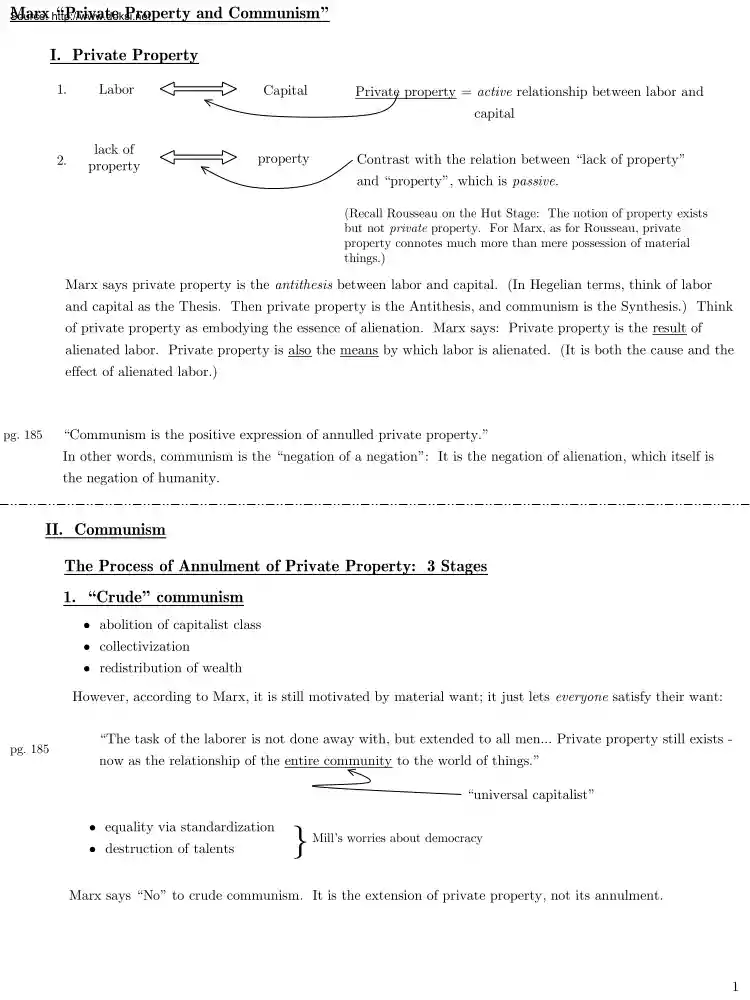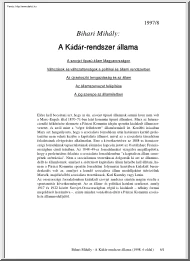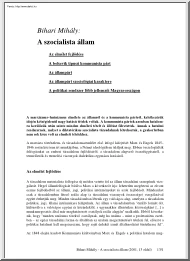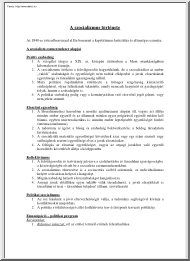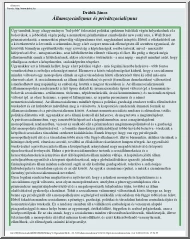Datasheet
Year, pagecount:2006, 3 page(s)
Language:English
Downloads:2
Uploaded:April 30, 2018
Size:479 KB
Institution:
-
Comments:
Attachment:-
Download in PDF:Please log in!
Comments
No comments yet. You can be the first!Most popular documents in this category
Content extract
Marx “Private Property and Communism” Source: http://www.doksinet I. Private Property 1. Labor Capital Private property = active relationship between labor and capital 2. lack of property property Contrast with the relation between “lack of property” and “property”, which is passive. (Recall Rousseau on the Hut Stage: The notion of property exists but not private property. For Marx, as for Rousseau, private property connotes much more than mere possession of material things.) Marx says private property is the antithesis between labor and capital. (In Hegelian terms, think of labor and capital as the Thesis. Then private property is the Antithesis, and communism is the Synthesis) Think of private property as embodying the essence of alienation. Marx says: Private property is the result of alienated labor. Private property is also the means by which labor is alienated (It is both the cause and the effect of alienated labor.) “Communism is the positive expression of
annulled private property.” pg. 185 In other words, communism is the “negation of a negation”: It is the negation of alienation, which itself is the negation of humanity. II. Communism The Process of Annulment of Private Property: 3 Stages 1. “Crude” communism • abolition of capitalist class • collectivization • redistribution of wealth However, according to Marx, it is still motivated by material want; it just lets everyone satisfy their want: pg. 185 “The task of the laborer is not done away with, but extended to all men. Private property still exists now as the relationship of the entire community to the world of things” “universal capitalist” • equality via standardization • destruction of talents } Mill’s worries about democracy Marx says “No” to crude communism. It is the extension of private property, not its annulment 1 Marriage Analogy Source: http://www.doksinet private property wife (object of single owner) becomes universal
private property becomes prostitute (object of all men) Only addressing the physical manifestations of oppression may fail to address the underlying cause of oppression. Marx on relationship between men and women pg. 186 It is the “most natural relation of human being to human being”. The form of this relation in a given society is one indicator of the degree of alienation present in that society. 2. “Political” Communism • Still in the process of the abolition of the state. • Still under the sway of private property. 3. “True” Communism The positive transcendence of private property: pg. 187 “The complete return of man to himself as a social being.” Marx on Man as a Social Being pg. 187 “Activity and mind, both in their content and in their mode of existence, are social.” Remember (from “Estranged Labor”): Productive activity is social in nature - it’s intimately linked with nature. pg. 188 “Society is the unity of being of man with
nature.” To be active as a human is to be socially active. (Hence the Lone Scientist working by himself in a laboratory is engaging in social activity.) pg. 188 “The individual is the social being.” Marx cautions us not to abstract society away from the individual. For him, there is no distinction between society and the individual. Marx compared with others: Mill’s ontology: {individuals, society} For Mill, these are distinct objects. Marx’s ontology: {individuals} For Marx, in a sense, society is just a property of the individual. Fascists’ ontology: {society} For the Fascists (Rocco & Palmieri), as we’ll see, individuals are just properties of society. 2 Source: http://www.doksinet Marx’s worry is that capitalist society is not a truly human society. pg. 189 Capitalist society emphasizes material possession. Things are seen mainly as possible objects of appropriation. Under True Communism, an emancipation of all senses will occur: Marx describes
the senses as “theoreticians” - they reflect the economic context in which they are used. Our senses impose economic structures on the objects that we experience. In particular, under capitalism, we sense the world in terms of appropriating objects. Communism rids our senses of these “false” filters. Marx claims that “true” human filters are social in nature: pg. 190 “The senses of the social man are other senses than those of the non-social man.” According to Marx, economic relations express the fundamental relations of life, which are production and consumption. All other relations (religion, family, state, law, etc.) are particular modes of production and/or consumption 3
annulled private property.” pg. 185 In other words, communism is the “negation of a negation”: It is the negation of alienation, which itself is the negation of humanity. II. Communism The Process of Annulment of Private Property: 3 Stages 1. “Crude” communism • abolition of capitalist class • collectivization • redistribution of wealth However, according to Marx, it is still motivated by material want; it just lets everyone satisfy their want: pg. 185 “The task of the laborer is not done away with, but extended to all men. Private property still exists now as the relationship of the entire community to the world of things” “universal capitalist” • equality via standardization • destruction of talents } Mill’s worries about democracy Marx says “No” to crude communism. It is the extension of private property, not its annulment 1 Marriage Analogy Source: http://www.doksinet private property wife (object of single owner) becomes universal
private property becomes prostitute (object of all men) Only addressing the physical manifestations of oppression may fail to address the underlying cause of oppression. Marx on relationship between men and women pg. 186 It is the “most natural relation of human being to human being”. The form of this relation in a given society is one indicator of the degree of alienation present in that society. 2. “Political” Communism • Still in the process of the abolition of the state. • Still under the sway of private property. 3. “True” Communism The positive transcendence of private property: pg. 187 “The complete return of man to himself as a social being.” Marx on Man as a Social Being pg. 187 “Activity and mind, both in their content and in their mode of existence, are social.” Remember (from “Estranged Labor”): Productive activity is social in nature - it’s intimately linked with nature. pg. 188 “Society is the unity of being of man with
nature.” To be active as a human is to be socially active. (Hence the Lone Scientist working by himself in a laboratory is engaging in social activity.) pg. 188 “The individual is the social being.” Marx cautions us not to abstract society away from the individual. For him, there is no distinction between society and the individual. Marx compared with others: Mill’s ontology: {individuals, society} For Mill, these are distinct objects. Marx’s ontology: {individuals} For Marx, in a sense, society is just a property of the individual. Fascists’ ontology: {society} For the Fascists (Rocco & Palmieri), as we’ll see, individuals are just properties of society. 2 Source: http://www.doksinet Marx’s worry is that capitalist society is not a truly human society. pg. 189 Capitalist society emphasizes material possession. Things are seen mainly as possible objects of appropriation. Under True Communism, an emancipation of all senses will occur: Marx describes
the senses as “theoreticians” - they reflect the economic context in which they are used. Our senses impose economic structures on the objects that we experience. In particular, under capitalism, we sense the world in terms of appropriating objects. Communism rids our senses of these “false” filters. Marx claims that “true” human filters are social in nature: pg. 190 “The senses of the social man are other senses than those of the non-social man.” According to Marx, economic relations express the fundamental relations of life, which are production and consumption. All other relations (religion, family, state, law, etc.) are particular modes of production and/or consumption 3
